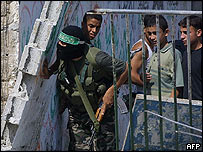
Recent fighting has been in one of the most densely populated areas in the world
|
BBC News Online looks at the key questions behind the current violence in the Gaza Strip.
What has sparked the latest surge in violence?
Israeli forces have moved into northern Gaza in force and Palestinian gunmen are fighting back. The incursion is becoming one of the bloodiest passages of fighting in four years of Palestinian uprising.
The aim of the operation, the Israelis say, is to stop militants from Hamas launching Qassam rockets into neighbouring southern Israel.
The escalation in Gaza comes in part because Hamas have managed to pack more explosives into their homemade rockets, making them far more deadly. For years they were ineffective, causing damage and some panic, but killing no-one. But this has changed dramatically in recent months.
On Wednesday, rockets fired by Palestinian militants killed two Israeli children and wounded at least 10 people in Sderot inside Israel.
What are the Israeli military's tactics?
The Israeli army has been trying to stop the rockets fired from Gaza for years. Palestinian militants are able to set up and fire and then escape, all within minutes, making it difficult for the Israeli forces to stop them.
Now the Israeli army is going into the heart of Jabaliya - the refugee camp that is home to about 100,000 Palestinians and said to be one of the most densely packed places on earth.
More than 100 tanks, armoured personnel carriers and bulldozers are involved in the operation, and helicopter gunships have been used.
The Israeli cabinet has backed plans to turn the current Gaza incursion into a major, open-ended offensive to stop the persistent rocket fire from the area.
The Israeli army has said that the it is clearing a 9 km deep buffer zone to force Palestinian militants into retreat, putting their rockets out of range of their targets in Israel.
Have these type of operations worked in the past?
The recent record is not good, and Hamas militants have even been able to fire off rockets into Israel during the current incursion.
The Israeli army has gone into Gaza to try to stop Qassam rockets before. An operation in Beit Hanoun, north east of Jabaliya, left about 20 Palestinians dead, more than 50 homes were destroyed, and hundreds of acres of orange groves levelled. The rockets did not stop.
The Israeli army is being forced to fight inside the tiny alleys of the refugee camps where it is difficult for armoured vehicles and tanks to manoeuvre. They are being faced by masked Palestinians firing automatic rifles and anti-tank missiles, and planting explosives along the streets of the camps in an attempt to blow up the Israeli tanks.
Even much smaller scale Israeli raids in Gaza have resulted in large numbers of casualties among Palestinian civilians and militants, and Israeli soldiers. The Israeli military has been reluctant to enter the congested cities and refugee camps in Gaza, for this reason.
If the Israeli operation is taken to its logical conclusion, the army may have to drive the militants out of the refugee camps.
This was attempted in March 2002 in Jenin, as part of a massive re-invasion of the West Bank. Large parts of the refugee camp in Jenin were levelled in days of intense house to house fighting that took a high Palestinian and Israeli toll.
Why does Gaza matter?
Israeli Prime Minster Ariel Sharon's plan to withdraw from Gaza, which Israel has occupied since 1967, has put it right at the centre of the current conflict.
Israel is planning to pull out its 8,000 settlers from Gaza and the troops that protect them as part of a disengagement plan. Israel will maintain control of Gaza's borders, coastline and airspace.
About 1.3 million Palestinians live in Gaza, about 900,000 of them refugees from the 1948 war that saw the establishment of Israel. It is a conservative place, where Hamas has a strong social and political influence through its network of mosques and the social services it provides.
Behind the Israeli operation to end Palestinian rocket fire is a struggle between the Israel military and Hamas. Mr Sharon wants to weaken Hamas before the pullout. Hamas wants to battle Israel to the last in the hope of claiming the credit for driving the Israelis out.
Mr Sharon is facing strong Israeli opposition to his withdrawal plan in Israel, and the current violence may be complicating his aims. The violence is seen by opponents as evidence that Israel cannot withdraw from Gaza and leave it to Hamas.